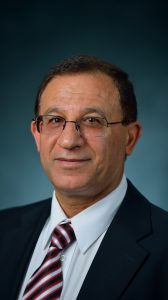
Yacoub ‘Jacob’ Najjar has been chair and professor of civil engineering at UM since July 2012. Photo by Thomas Graning/Ole Miss Digital Imaging Services
Six years ago, Yacoub “Jacob” Najjar was one of two new department chairs in the University of Mississippi School of Engineering. With vision and dedication, the chair and professor of civil engineering accepted the challenge to build upon the solid foundation established by his predecessors and reach even higher levels of achievement.
Najjar reflected on the department’s growth over the past few years.
“Our graduate program has been nationally ranked for most of the period,” he said. “We have been ranked in the top 70s among similar programs within public universities. Our faculty has been active in research, teaching and service at local, national and international levels.”
As examples, Najjar noted his civil engineering colleagues’ achievements: Cristiane Surbeck serves as president of the Environmental and Water Resources Institute of the American Society of Civil Engineers (ASCE); Waheed Uddin has been recognized multiple times at international, national and state levels; Ahmed Al-Ostaz has been named director of the newly established Center for Graphene Research and Innovation and as the leader of the UM constellation on disaster resilience.
Also, Elizabeth Ervin and Hakan Yasarer have been picked to attend selective teaching workshops; Hunain Alkhateb is nationally known for her work on additive manufacturing and 3-D printing; and Christopher Mullen is an active member of the ASCE Engineering Mechanics Institute Objective Resilience Committee.
“Even though we have achieved a good amount, I believe the department will realize more recognitions in the future,” Najjar said.
One of Najjar’s goals was to create and maintain a happy civil engineering family by encouraging a collegial work environment. He said he believes that, too, is being achieved.
“I see good interactions among CE faculty and staff,” he said. “To reinforce this even further, a few years ago I started the pre-faculty meeting social time. I dedicate at least 30 minutes before our faculty meetings for social interactions. I am a firm believer that for the family members to nicely work together, they have to first like each other. I think we are on the right track.”
Finally, Najjar wanted to align the departmental strategic goals with those of the School of Engineering and the university to efficiently serve the community, state and nation. The work of the CE faculty on this front has been “outstanding,” he said.
“Ms. (Grace) Rushing and Dr. Alkhateb (current and former faculty advisers, respectively, of UM’s ASCE student chapter) have been doing a wonderful job on outreach activities, such as the annual catapult competition, Science Olympiad water tower and UM STEM/engineering summer camps for students from various Mississippi schools,” Najjar said. “Dr. Ervin has organized various activities, via the Society of Women Engineers, by engaging many girls from Mississippi high schools. Most of the CE faculty are effectively engaged in technical and service activities through state and the national level committees.”
Najjar said that securing ABET accreditation in 2016 for the maximum allowance of six years and passing the evaluation with a “clean sheet” has been the most rewarding experience for all in the CE department.
“It was a collective effort of everyone in the department,” he said. “Furthermore, the successful efforts of the department’s administration, faculty and staff were recognized with the 2015 Excellence in Promoting Inclusiveness in Graduate Education Award from the UM Graduate School. In addition, a number of CE faculty and staff received the School of Engineering research and service awards.”
Najjar received the 2017 CE Department Award for Excellence in Teaching from the ASCE student chapter, which he said was especially rewarding because his teaching contributions have been reduced since he became department chair.
A graduate of the University of Oklahoma, Najjar served as interim chair and professor of civil engineering at Kansas State University prior to joining UM. His teaching awards and honors include the 2006 Midwest Section Outstanding Teaching Award from the American Society for Engineering Education and the 2012 Kansas State Commerce Bank Outstanding Undergraduate Teaching Award.
Najjar’s research focuses on the application of artificial neural networks and computational mechanics to advance the civil infrastructure. His research on the interaction of soil and civil structures, transportation, geomechanics, geosynthetics and geoenvironmental systems has yielded more than 90 peer-refereed articles.
Najjar and his wife, Oana, have three sons: Danny, 25, Adam, 12, and Noah, 10.